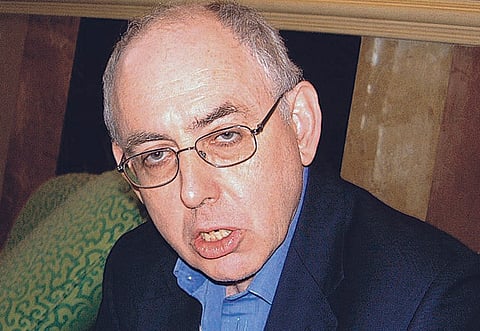Prominent Middle East scholar Fred Halliday dead
Prominent Middle East scholar Fred Halliday died Monday in Barcelona after suffering from a terminal illness

Dubai: Prominent Middle East scholar Fred Halliday died Monday in Barcelona after suffering from a terminal illness.
Halliday was born in Ireland in 1946 and studied at University of Oxford's Queen's College, and the School of Oriental and African Studies (SOAS) in London.
The last academic position Halliday held was as professor emeritus of international relations in the Centre for the Study of Human Rights at the London School of Economics.
He was a former chairman of the research committee of London's Royal Institute of International Affairs (Chattham House) and was on the Advisory Council of the Foreign Policy Centre in the UK.
Fred Halliday articles
Halliday often spoke about the West's lack of understanding of the Middle East, despite the long history of relations between the two regions.
He attributed the gap to romantic Western myths about the region which he argued did not convey the true picture.
He was known to have immersed himself in Arab culture as part of studying the region, and was fluent in Arabic as well as English, French, German and Spanish. Six of his books have been translated to Arabic.
In recent years, Halliday's writings on the Middle East focused on relations between Muslims and the West as well as anti-Arab sentiment in the UK
Halliday wrote one of his most popular books, Arabia without Sultans at the age of 23, which was published in the 1970s. The book discussed the lack of transparency and exploitation of oil in southern Arabia.
In a 2004 interview with Gulf News, Halliday said the Gulf region was a "very difficult" and unstable region where full democracy was not possible in the foreseeable future.
He said the region lived "on the edge of three volcanoes, Iran, Iraq and Saudi Arabia… Each of these countries is going to be another volcano sometime in the next months or years. We don't know how, but there will be other explosions," he said.
He had been a regular op-ed contributor to Gulf News for several years, writing about Middle East issues with a focus on Yemen.
Gulf News opinion editor Manal Alafrangi studied with Halliday at the London School of Economics, where she studied the Middle East. She said his first lecture left "a lasting impression".
"He was able to balance his knowledge and first-hand experiences in the Middle East with plenty of anecdotes and jokes from the region," she said.
"His passion for Yemen was indomitable. To his students, he was simply known as Abu Thawra."
He was a rare academic in that he put time and effort in immersing himself in the Middle East, learning both Arabic and Persian.



